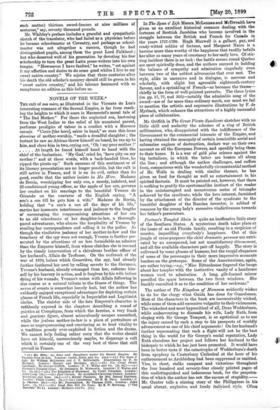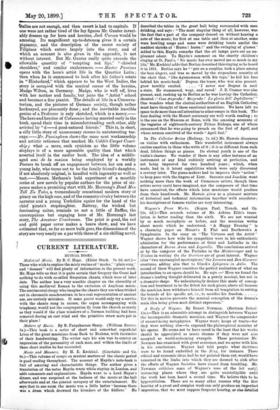NOVELS OF THE WEEK.* THE cult of ma mere, as
illustrated in the Vicomte de Luz's interesting romance of the Second Empire, is far from reach- ing the heights to which it soars in Marmontel's moral tale of "The Bad Mother." For there the neglected son, hastening from the West Indies to the relief of his unnatural parent, performs prodigies of valour in a conflict with a Morocco corsair. " Col.& [the hero], sabre in hand," so runs this locus dassicus of mother-worship, "made a dreadful slaughter ; the instant he saw an African throw himself on board, he ran up to him, and clove him in two, crying out, 'Oh ! my poor mother !'
At length he found himself hand to hand with the chief of the barbarians. My God,' cried he, have pity on my mother !' and at these words, with a back-handed blow, he ripped the pirate up." Such excesses of this sentiment or of its literary presentation are no longer possible, but the cult is still active in France, and it is on its evil, rather than its good, results that the author insists in Ma Mere. Madame de Bersia, worshipping her only son, a moody, indolent, and ill-conditioned young officer, as the apple of her eye, governs her conduct on his marriage to the beautiful Yvonne de Gerando on the converse of the English saying, "A son's a son till he gets him a wife." Madame de Bertha, holding that "a son's a son all the days of his life," carries her insensate interference and jealousy to the lengths of encouraging the compromising attentions of her son to an old schoolmate of her daughter-in-law, a thorough- paced adventuress, who abuses the hospitality of Yvonne by stealing her correspondence and selling it to the police. As though the vindictive jealousy of her mother-in-law and the treachery of the spy were not enough, Yvonne is further per- secuted by the attentions of no less formidable an admirer than the Emperor himself, from whose clutches she is rescued by the timely intervention of a chivalrous brother officer of her husband's, Allain de Treflenec. On the outbreak of the war of 1870, before which Genevieve, the spy, had already further feathered her nest by selling secrets to the Germans, Yvonne's husband, already estranged from her, redeems him- self by his bravery in action, and is forgiven by his wife before dying of his wounds, Yvonne's union with Allain following in due course as a natural tribute to the fitness of things. The nexus of events is somewhat loosely knit, but the author has evidently enjoyed exceptional advantages for depicting certain phases of French life, especially in Imperialist and Legitimist circles. The sinister side of the late Emperor's character is ruthlessly exposed in the chapters describing a round of gaieties at Compiegne, from which the heroine, a very frank and gracious figure, almost miraculously escapes unscathed, while the jealous mother-in-law is a piece of portraiture at once so unprepossessing and convincing as to lend vitality to a tradition grossly over-exploited in fiction and the drama. We cannot help feeling rather sorry that the writer should have set himself, unconsciously maybe, to disparage a cult which is certainly one of the very best of those that still prevail in France.
• (1.) Ma Mere; or, Sons and Daughters under the Second Empire. By Vicomte Jean de Luz. London : Smith, Hider, and Co. [6e.)—(2.) The Span o' Life. By William McLennan and J. N. McIlwraith. Illustrations by F. de Myrbach. London : Harper and Brothers. [6s.]—(3.) The Great Pirate Syndicate. By George Griffith. London : F. V. White and Co. Ds. 6d.3—(4.) lbstune's Tangled Stain. By Jeannette H. Walworth. London : F. Warne and Co. [3s. Sd.3—(5.) The Kingdom of Mammon. By Violet Tweedale. London : John Long. MI—ie.) Jack Curzon. By Archibald Clavering Gunter. London : Routledge and Sons. [Sa.)—(7.) Master Passions. By Mrs. Darent Harrison. Loudon: Fisher Unwin. [6s.]—(8.) Calumnies. By E. M. Davy. London : C. A. Poisson. (68.)—(9.) Mr. Passingham. By Thomas Cobb. London : John Lane. Ds. SK1.]—(10.) Dead Men Tell No Tales. By B. W. Hornung. (" The Novelist," No 1) London : Methuen and Co. (6d.) In The Span o' Life Messrs. McLennan and McIlwraith have given us an excellent historical romance dealing with the fortunes of Scottish Jacobites who become involved in the struggle between the British and French for Canada in the years 1757-1760. Hugh Maxwell is a gallant, gay, and ready-witted soldier of fortune, and Margaret Nairn is a heroine more than worthy of the happiness that tardily befalls her after so many years of constancy to her early love. Of stir- ring incident there is no lack : the battle scenes round Quebec are most spiritedly done, and the authors succeed in holding the balance of sympathy and admiration singularly even between two of the noblest adversaries that ever met. The style, alike in narrative and in dialogue, is nervous and scholarly, with slight but agreeable eighteenth-century flavour, and a sprinkling of French—as becomes the theme— chiefly in the form of well-pointed proverbs. The three lyrics (on pp. 17, 77, and 305)—notably the admirable song of the sword—are of far more than ordinary merit, nor must we fail to mention the artistic and expressive illustrations by F. de Myrbaoh, which enhance the attractions of a highly successful piece of collaboration.
Mr. Griffith in The Great Pirate Syndicate sketches with no little skill and audacity the schemes of a ring of British millionaires, who, disappointed with the indifference of the Government to the commercial interests of the Empire, and having obtained the monopoly of certain irresistible aerial and submarine engines of destruction, declare war on their own account on all the European Powers, and speedily bring them to their knees. It is a war of gold plus science against the big battalions, in which the latter are beaten all along the line ; and although the author challenges, and suffers from, comparisons with the wonderfully circumstantial method of Mr. Wells in dealing with similar themes, he has given us food for thought as well as entertainment in his spirited fantasia. It must be pointed out, however, that there is nothing to gratify the sportsmanlike instinct of the reader in the uninterrupted and monotonous series of triumphs achieved by the syndicate, while the love interest, furnished by the attachment of the director of the syndicate to the beautiful daughter of the Russian inventor, is robbed of romance by the young lady's excessive vindictiveness towards her father's persecutors.
Fortune's Tangled Skein is quite an inoffensive little story of the Southern States. A mysterious death takes place at the home of an old Florida family, resulting in a suspicion of murder, imperilling everybody's happiness. Out of this jungle of cross-purposes the chief dramatis personm are extri- cated by an unexpected, but not unsatisfactory denouement, and all the available characters pair off happily. The story is enlivened by some gleams of humour, but the turgid eloquence of some of the personages in their more impressive moments borders on the grotesque. Some of the Americanisms, again, are rather trying,—e.g., "Miss Rittenhouse fingered the bangs about her temples with the instinctive vanity of a handsome woman used to admiration. A long, gilt-framed mirror panelled the space between the two front windows. She frankly consulted it as to the condition of her neckwear."
The author of The Kingdom of Mammon evidently wishes to do for the clergy what Ouida has done for Guardsmen. Most of the characters in the book are inconceivably wicked, while some of them add excessive vulgarity to their viciousness. The wickedest and most hypocritical of all, Dean Wedderburn, while endeavouring to dissuade his wife, Lady Ruth; from eloping with Sir George Tempest, is so egotistical as to use the injury caused by such a step to his prospects of worldly advancement as one of his chief arguments! On her husband's further representing that such a flight will not be the best thing in the world for Sir George's social reputation, Lady Ruth abandons her project and follows her husband to the bishopric th which he has just been promoted. It would have been in better taste if the catastrophe of Wedderburn'a death from apoplexy in Canterbury Cathedral at the hour of his enthronement as Archbishop had been suppressed or omitted. Vice, in short, stalks rampant and victorious throughout the four hundred and seventy-four closely printed pages of this undistinguished and indecorous book, for the perpetra- tion of which the author has not the excuse of stupidity.
Mr. Gunter tells a stirring story of the Philippines in his usual abrupt, explosive, and freely italicised style. Often ttaliell are not enough, and then resort is had to capitals. If one were not rather tired of the lay figures Mr. Gunter invari- ably dresses up for hero and heroine, Jack Curzon would be amusing. Its magnificent up-to-dateness gives it a certain piquancy, and the description of the secret society of Filipinos which enters largely into the story, and of which an account is also given in the appendix, is not without interest. But Mr. Gunter really quite exceeds the allowable quantity of "tempting red lips," "chiseled shoulders," and similar exuberances. — Master Passions opens with the hero's artist life in the Quartier Latin; then when he is summoned to look after his father's estate in "Hinterland," which appears to be the West Indies, the story is occupied with the musical career of the heroine, Madge Wilton, in Germany. Madge, who is well off, lives with her mother and family, but joins the " Artist " school and becomes a fine pianist. The details of life in a Conserve- torium, and the pictures of german society, though rather hackneyed, are pleasantly done ; and the inevitable irascible genius of a Professor is only sketched, which is a mercy.-- The hero and heroine of Calumnies having married early in the book, spend their time in misunderstanding each other, ably assisted by " d—d good-natured friends." This is, in short, a silly little story of unnecessary storms in uninteresting tea- cups.—Mr. Passing/jam shows the same neat workmanship and artistic, reticence that marked Mr. Cobb's Carpet Court- ski p ; what more, such cynicism as the little volume displays is ot a more agreeable quality than that which asserted itself in the earlier book. The idea of a middle- aged anti de la maiscon being employed by a worldly Peeress to break off an engagement between her son and a young lady, who turns out to be the family friend's daughter, if not absolutely original, is handled with ingenuity as well as tact —Messrs. Methuen's bold experiment of a monthly series of new novels by popular authors for the price of six- pence makes a promising start with Mr. Hornung's Dead Men Tell No Tales, a tremendously sensational modern story of piracy on the high seas, and of the romantic rivalry between the narrator and a young Yorkshire squire for the hand of the chief pirate's stepdaughter. Rattray, the wicked but fascinating suitor, reminds us not a little of Raffles, the unscrupulous but engaging hero of Mr. Hornung's last story, The Amateur Cracksman. The print is good, the red and gold paper cover makes a brave show, and we have estimated that, so far as mere bulk goes, the dimensions of the -story are very nearly on a par with those of a six-shilling novel.







































 Previous page
Previous page